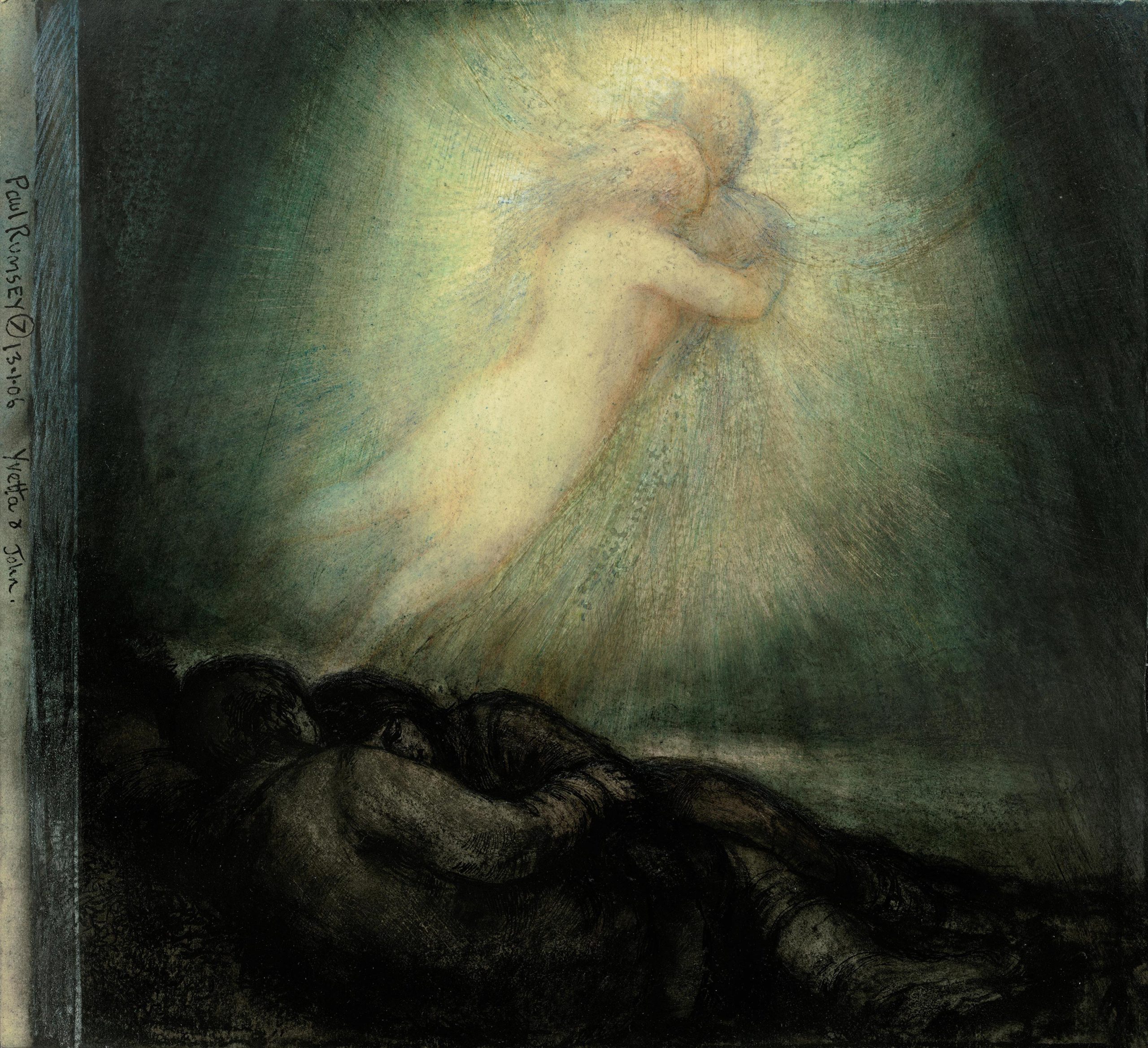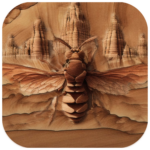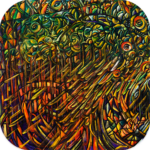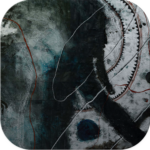About The Slide That Buried Rightful

Q: The value system in The Slide That Buried Rightful is all-important, but as I was reading, I was warring with myself, trying to sort out what was “rightful” and what wasn’t.
RS: The sorriest thing about the human condition, I think, is the desire for simple answers. And nowhere is that desire more lamentable than in the moral sphere—the determination of right and wrong, just or unjust. We want things to be so much simpler than they are.
Q: The question that Garris faces is one that we all have to answer, sooner or later.
RS: I think so. There’s no way to ignore it.
“The older I get, the more I realize how out of phase I am—and have always been—with the cynicism of a cold-blooded world.”

Q: There are conventional expectations that the story introduces, then foils—most notably, the resolution of the conflict between Garris and Tom Astley.
RS: The hero forces a comeuppance on the villain: that’s a story cliché that people never get tired of because it’s so satisfying. It’s the outcome we privately desire for many of our own conflicts. But it’s a lie. Life doesn’t work that way, and the underlying implication—that forced comeuppance should be our chief moral goal—is misguided and injurious, I think.
Q: We all believe we’re on the “right” side.
RS: All of us. Always. The surest way to write an unbelievable character is to make that character a self-conscious villain, someone who does wrong with intention. It’s ridiculous when politicians, journalists or partisans accuse their adversaries of willful evil, but it’s common. That’s how we are. Villainization dehumanizes the adversary and makes hatred and violence possible. It’s viscerally satisfying, and that’s why we do it.
Q: Garris’ deeper insight seems to come through his understanding of the wisdom of his daughter. I sense a love of youth, and of the truth of Yvetta’s belief in “Real Selves.”
RS: My heart is with Yvetta and John. The older I get, the more I realize how out of phase I am—and have always been—with the cynicism of a cold-blooded world. I’m with Garris in that regard. A world that can’t see past partisan hatred, that can’t find its way out of war, isn’t a world I can embrace. It’s the same world that finds artistic value in the depiction of brutality for its own sake. “It’s a brutal world, and cruelty is an adrenaline rush, so let’s wallow in it.” Only a belief in higher powers and the inherent rightness of the human heart can lead us out of that hell.
Q: The presence of Astley, the primitive conditions in the Arctic, and the life of the Eskimos put us in a world in which familiar ideas about right and wrong seem artificial.
RS: It’s worth remembering that if you sent someone like Astley to a clinical psychologist, he would probably be typed as a psychopath. And we now know that these folks are born, not made. The old ideas about right and wrong weren’t designed with people like that in mind. If Astley has no feeling for others, if his conscience is defective, is he guilty or innocent when he commits atrocities? And who decides? The Insanity Defense really threw down the gauntlet. “Innocent by reason of insanity.” How did we come to have people like Astley in our gene pool? What kind of justice can we expect in a world like that? In Rightful, the Deputy is irrelevant. When it comes to right actions, how relevant are the police and the courts in a modern metropolitan area?
Q: Your depiction of the Eskimos is sympathetic, but conditional.
RS: The popular view of native cultures in our era is simplistic. As recompense for having stolen their lands, decimated them with disease and destroyed their lifestyle, we’ve made them saintly. We count that as rightful behavior, but it’s far from the truth. Native cultures struggled, and still struggle, with many of the same things that we do, especially in their response to adversity.
Q: The friction between the Inupiaq people—Ned especially—and the whites is dramatic.
RS: Some ethnic groups passed through a Neolithic era, and some did not. Portions of the human species experienced a gradual transition from a hunter-gatherer existence to a settled agrarian lifestyle. The Eskimos were hunter-gatherers, and were abruptly thrust into a very different reality. And because of disease and cultural pressures from colonizing whites, that shift was, to a great degree, involuntary.
Q: Teeth are an important part of the story’s image system.
RS: Teeth are important for creatures who have them. They have a lot to do with survival, but they also reveal how we view our relationship with the world. They’re a critical part of our psyche. Teeth show up with surprising frequency in dreams. The statistics on this are impressive. Using teeth, losing teeth, having teeth crack or rot or fall out. Or being victimized by the teeth of someone or something else. We’re born with the instinct to suck. Our instincts about teeth may be even more deeply rooted. Sucking is for mammals. Our wiring for teeth goes back to amphibian and reptilian ancestors. Teeth mean mastery and control. Or the opposite, if our teeth don’t work, if foreign teeth find us.
Q: Garris’ experience as an American soldier in Russia was a chapter of history I was unaware of.
RS: It was strangely similar to what happened in Korea and Vietnam, but on a smaller scale. From Woodrow Wilson’s perspective, it was geopolitics. Russia under the czar was an American ally against the Kaiser, but when the Russian Revolution occurred, the Bolsheviks wanted nothing to do with the Great War. So Wilson sent American soldiers to fight them. The soldiers ended up burning down villages and killing peasants, which made no sense to anyone except Wilson.
Q: So Garris is like a disillusioned Vietnam vet.
RS: Yes. His allegiance to America is shaken by his military experience. His father and uncle were driven out of Canada because of their French heritage. I imagined Garris might have donned his uncle’s beret after coming back from Russia, as a sign of his estrangement.
Q: I enjoyed his carpenter’s-eye view of the world.
RS: My grandfather was a woodworker, and so was my uncle. I spent a lot of time with wood as a child. For me, writing from inside Garris was a treat.
Q: The result of the slide is grim.
RS: It is. The way people respond to accidental tragedy has fascinated me all my life. When I was a teenager, I read a Thornton Wilder novel about a bridge that fell in Latin America. After the disaster, a priest attempts to find out what it was about the people on the bridge that made God take their lives. Wilder made fun of the priest and his search, which I didn’t care for. But the premise for the story stuck with me.
But it took a long, long time to matriculate. I learned about the real meaning of morality and justice from my first wife, and as I was coming into that understanding, the story idea for Rightful emerged. That was in 1976 and 1977. I wrote most of the music back then. I worked on the text off and on for the next three decades, but I was mostly focused on other things.
The project came full center again in 2014 and 2015. We began to record the ballads. But we hit a snag when it came to “casting” Kiachuk. It took two years to find Hollie Fullbrook, so again Rightful was put off. In 2020, the coronavirus struck, and the world turned apocalyptic. That put me in the Rightful mood, so I waded back in.
Q: For Astley, the slide is a deus ex machina. But it’s a strange one.
RS: Generally a deus ex machina is used to bring a story to a desired closure. In this case, it prevents any of the expected closures from occurring—at least in the surface world. Beneath the slide, something else is going on.
Q: At the end, Garris faces the slide, the “source of blizzards.” Do you think we’ve lost sight of the threats we face as part of being alive?
RS: In the wealthy countries, our lives are coddled. The pandemic that struck in 2020 may have been, with all its cruelties, a needed correction. This is the life other creatures live. These are the conditions our forebears survived for millennia. There is only one gift that comes with opening your eyes and drawing your first breath. All the other gifts and principles, rights and rules, slices and privileges are things we’ve imagined.
Q: Do you think it’s important for us to carry the unavoidability of death with us? To keep it close?
RS: Critically important. If we don’t, we turn life into a web of trivia—entertainments, diversions, pointless lusts and thrills. And it’s in that moral vacuum that the fascination with brutality creeps in. That’s the tragedy of our Roman culture, in my opinion. The loss of meaning. The amnesia, the forgetfulness about the value in life, about what life can be.
Q: The peace Garris finds at the end seems like a discovery of something interior, but it’s also an acceptance, a resignation.
RS: Yes, it is. The modern desire to right all wrongs through social action is laudable, but misguided in many respects. There are things about the human condition we have to accept, like death and Tom Astley. I’ve been a student of the country blues all my life. There’s a great wisdom in that music. Like Biblical wisdom, it was born from slavery. Willie McTell, Blind Willie Johnson, Son House and the rest— The country blues is about acceptance. There is no more powerful expression of that outlook than the conflict between Willie McTell and John Lomax preserved for posterity in the Library of Congress recordings. Willie understood the universality of the blues. He was black and blind, but he was wise. Lomax was not. A wisdom like Willie’s is the foundation for human harmony, I think.
Q: As in your other novels, belief figures prominently—in this case, the belief that John and Yvetta hatch.
RS: Most of the “developed” world has lost belief, and I don’t think we can survive without it. The beliefs of our predecessors don’t work for us, because they’re incompatible with science and reason. But material wealth, sports, political conflict, entertainment, social networking—these things won’t sustain a civilization. They aren’t nourishing our souls and spirits. We will perish without belief. We are perishing now.
Q: In writing this story, you drew on personal experiences in the Arctic?
RS: Yes. I’ve wandered “The Teeth”—the Kigluaik Mountains, north of Nome—at all seasons. My wife and I ran dogs with Jerry Austin, who did the Iditarod eighteen times before he died. And I spent time in Eskimo villages with a friend who lived with the natives for many years, teaching school.
Q: One of the most arresting images of the novel is the “giant screw-thread” that is the aurora borealis, which you depict as having a will and purpose of its own, signaling to Garris “the dawn of some other world.” Did the northern lights inspire the idea for the novel?
RS: They certainly helped. The aurora and the darkness in winter can make the Arctic feel like another dimension. That, combined with the Inupiaq idea of the kazgi, gave me a way to externalize the concept of justice that Garris finds and embraces.
2022















